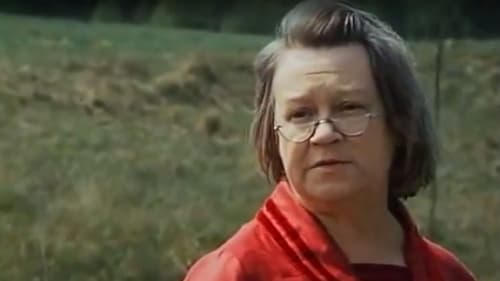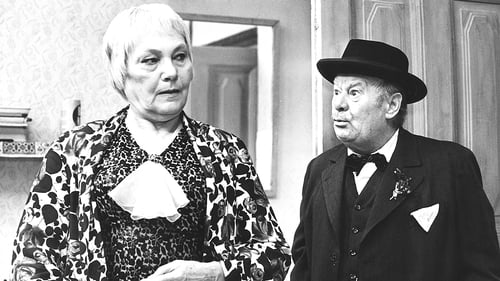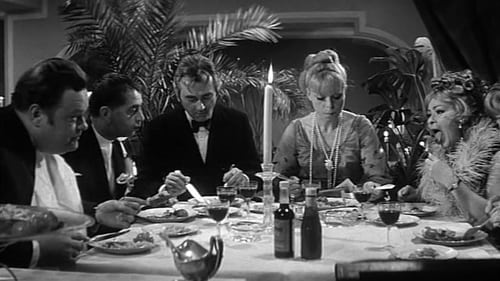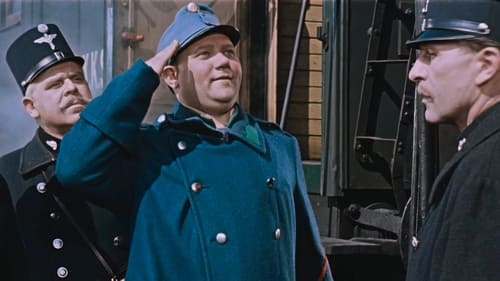
Two kind but foolish sisters live together in their villa in a small town in South Bohemia. Fany (Natasa Gollová) has never married and Andelka (Eva Svobodová) is a widow. In the morning, the two sisters go into town. They need to buy fuel oil, put money in the bank and give plums to the teller. In the meantime an smallish orange Skoda MB car parks at their house, with Hermínka (Iva Janzurová), the old ladies' niece, and her fiancé Michal (Jirí Hrzán) in it. Michal has forgotten to bring flowers and has to go into town to fetch them. At the bank, Fany wants to deposit money but the minute the teller opens the safe, a thief arrives. He knocks the teller and Fany unconscious and runs away with the money. When Fany comes to her senses again, she sees Michal and accuses him of being the thief.


The bank officer Bedrich Hroch is sent by the bank director to the zoo, which asked an allocation of one and half kg of gold for a gold tooth for a hippo. During the check up of the hippo's teeth Bedrich is swallowed by the hippo. The man does not die in the hippo's guts and he chats quite happily with his frightened wife Dása. Journalist Pip Karen, his friend is also present to the dialogue and he has immediately an idea how to use this special situation. He tells to the new minister Borovec and his opponent professor Fibinger that there is a hippo in the zoo which can speak. He also tells them how to use this situation for a political propaganda.

It is 1905. The police director gets Jindrich Legenda (Eduard Cupák) shadowed as, yet Legenda had served his sentence for a burglary, the jewels have not been found. Russian revolution encouraged also Czech workers to fight for their rights. Radical anarchists are followed by Legenda's friend Karel Wohryzek (Vladimír Mensík) who was forced to collaborate with the police as he was convicted of pornography distribution.


In the thick woods at the edge of the Bohemian Forest, two border guards are keeping watch - rifleman Kucera (Rudolf Jelínek) and dog handler Stencl (Josef Hajducík), whose sluggishness and clumsiness have won him the nickname Simpleton. The official army dog, the bitch Líza, picks up the scent of an alien dog on the German side - Black Wolf. She bites through her leash and runs away. Soon afterwards, the border boundary was interrupted. The two soldiers are wounded in the gunfire that follows, but Stencl's shot also hits the target and the intruder - an attractive woman in a black jersey - is dead. The investigation reveals that this agent knew someone among the local residents. The locals are all called in to identify the body but nobody admits to knowing the woman.


Czech nobleman Petr Vok of Rozmberk (Milos Kopecký) is no longer so young, but his amatory adventures continue to arouse the envy of men and the indignation of respectable ladies. In his "female retinue" at the chateau in Bechyne he has twelve comely girls, but he still manages to seduce the miller's wife and the maid. Lord Vok is in great financial difficulties. His elder brother Vilém advises him to marry a rich woman. Petr surprises him by announcing his intention to marry the very young Katerina of Ludanice.

Three blue collar workers have a night out in big city Prague.

The invincible agent Cyril Juan Borguette alias W4C has been assigned a mission to go to a hotel in Prague, get hold of a saltcellar with a plan for the military exploitation of Venus hidden in it, and hand it over to the beautiful agent Alice. He will have to compete for the saltcellar with other agents working for the world's various greater and smaller powers. The head of the Prague counter-intelligence unit gets news of agent W4C's mission. Deficient in personnel, he nominates accountant Foustka as agent 13B. Mr Foustka takes his dog Pajda with him and the two head for the airport. Pajda helps him track down agent W4C in a classy hotel that becomes the battleground for the interests and plans of the secret agents from different countries, each trying to get hold of the precious saltcellar.


Italian Announcer (voice)
During the Second World War, an old fortress is transformed into a detention camp for arrested allied generals who the Germans provide with every possible comfort. In the nearby garrison camp, however, hundreds of captured private soldiers try to survive hunger and cold.

primář

Engineer on a construction site

Sláma

The title of this highly-regarded Czech drama translates as Wolf Trap. Set in the 1920s, the story revolves around an ambitious young provincial politician (Miroslav Dolozai) who enters into a marriage of convenience with a smotheringly possessive -- and much older -- woman (Jirina Sejbavola). Hoping to temporarily escape his overbearing wife's clutches, the husband strikes up a friendship with her young ward (Jana Brejchova). The relationship blossoms into a deep abiding love, but the jellyfish husband can't bring himself to declare his ardor to the girl. Even after the death of the wife, the husband hasn't the intestinal fortitude to admit his passion, and the results are bleak indeed for the unfortunate ward. Director Jiri Weiss does a masterful job staging his story of frustration and denial against a backdrop of post-WWI bourgeois banality.

A comedy based on the novel of Jaroslav Hašek's The Good Soldier Svejk happens during the World War I. I Dutifully Report: In the introduction to the second part of the film adaptation of Hašek's novel The Good Soldier Švějk presents his main character Josef Švejk. With the distinctive traditional Czech cartoon character of a soldier Svejk, this time you meet on the way to the front and eventually right in the firing line. You can look at his famous train events, and also probably the most famous episode of the novel, Švejk's Budějovice anabasis. Don't miss the scene with the secretly bought cognac, the episode with Svejk as a fake Russian prisoner of war, including the court scene, and the scene in which lieutenant Dub is caught in a brothel. Despite the criticism, Steklý's adaptation is undoubtedly the most famous and memorable at present.

Versión cinematográfica de la famosa novela satírica inacabada del escritor checo Jaroslav Hašek, publicada en 1921 y 1922, que narra la historia de las aventuras de un veterano soldado checo llamado Josef Švejk durante la Primera Guerra Mundial. La historia comienza con el asesinato del archiduque Francisco Fernando. Švejk es detenido en la taberna por un agente de la policía secreta y acaba en un manicomio, pero finalmente es puesto en libertad. Presume de haber sido declarado oficialmente idiota y manifiesta un patriótico entusiasmo por la guerra y la monarquía austro-húngara. Posteriormente es reclutado en el ejército. Su forma especial de atender a las órdenes de sus superiores y la forma de ejecutarlas deja dudas en el espectador acerca de su posible estupidez o sabiduría...


La 1ª brigada blindada de carros checoslovaca, lucha junto a las fuerzas soviéticas, combatiendo cerca de la frontera checoslovaca, y participando en la batalla del paso de Dukla. La película representa la lucha por Eslovaquia y la exitosa liberación de Ostrava en el norte de Moravia. Representa la batalla para el puente de Miloše Sýkory en la ciudad de Ostrava, donde se ve el puente real.

German researcher, chief engineer Pracht
Based on a true story

Commentary (voice)

Commentary (voice)

Commentary (voice)

Commentary (voice)

Commentary (voice)

factory owner Hajek

Commentary (voice)










